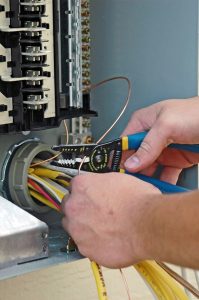
Picture this: You move into a new home and your good friend John Doe—who enjoys learning about residential electrical codes—has pointed out an electrical code violation or two. You shrug it off because it doesn’t seem like that big of a deal to you. The police won’t give you a ticket over faulty wires!
The issue with the tale above is that there is, in fact, a big problem with having an electrical code violation in your home. Why? Because it puts everyone in the home at risk. At a minimum, you will encounter short-circuiting galore; at the worst, your home could burn down.
John Doe’s knowledge of local electrical codes lets him know when he needs to call for electrical repair in Chicago, IL because of a violation. Simply being aware of common violations that happen every day can make a huge difference in keeping you are your loved ones safe.
But what do you need to know? Continue reading to find out.
National v. Local Code
Don’t panic! We aren’t going to regale you with a tale of two codes today. We just want to make sure you understand what electrical code your local electrician will be checking when you ask him to come by.
In short, the national code provides a guideline of sorts for localities to create their own codes. They can make the national code their code exactly, or they can tweak it as need.
A trained and experienced electrician will know what the current Chicago Electrical Code dictates and what repairs or changes are required to make sure your home is up to snuff.
Common Code Violations in Chicago
You don’t need to have the national or local electrical codes memorized to keep your home safe. It is often enough to be able to spot some of the more common issues that occur so you, like good ol’ John Doe, know when the time has come to call a professional.
- Poorly insulated wires: A wire that has been stripped too much exposes an excess of bare wire which could allow it to come in contact with its surroundings like the box or another wire.
- Using aluminum wiring: Aluminum wiring was used instead of copper wiring for a short time between the late 60s and early 70s. Some homes still have their old aluminum wiring which presents a problem for home safety due to the metal’s inherent weaknesses. Keeping old aluminum wiring can even void your home insurance policy!
- No smoke or carbon monoxide detectors: Smoke detectors and carbon monoxide detectors are vital to keeping home residents safe. If your detectors have been disconnected or, worse, removed make sure you get them into working order ASAP.
- Incorrect circuit breaker: Using the wrong circuit breaker or outlet puts you and your appliances at risk. You want to make sure that you have properly installed GFCI and AFCI outlets in the correct areas of your home.
- Bad DIY wiring: Even the best DIYer can violate electrical codes without knowing it. Whether it is using the wrong outlet, overcrowding a service panel, or improper grounding, it is easy to mess up residential electrical wiring if you aren’t a trained professional.
At the end of the day, the best way to ensure your home is free of any electrical code violations or problems is to employ the services of a trained electrician.
ServiceMax Is Open 24/7—All Day, Every Day! Contact us today to schedule electrical services.